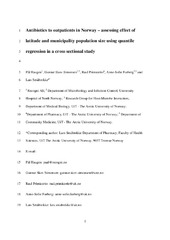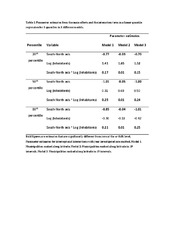| dc.contributor.author | Haugen, Pål | |
| dc.contributor.author | Simonsen, Gunnar Skov | |
| dc.contributor.author | Primicerio, Raul | |
| dc.contributor.author | Furberg, Anne-Sofie | |
| dc.contributor.author | Småbrekke, Lars | |
| dc.date.accessioned | 2018-06-27T12:29:19Z | |
| dc.date.available | 2018-06-27T12:29:19Z | |
| dc.date.issued | 2017-09-29 | |
| dc.description.abstract | High antibiotic consumption rates are associated to high prevalence of antimicrobial resistance. Geographical differences in dispensing rates of antibiotics are frequently analysed using statistical methods addressing the central tendency of the data. Yet, examining extreme quantiles may be of equal or greater interest if the problem relates to the extremes of consumption rates, as is the case for antimicrobial resistance. The objective of this study was to investigate how geographic location (latitude) and municipality population size affect antibiotic consumption in Norway. We analysed all outpatient antibiotic prescriptions (n > 14 000 000) in Norway between 2004 and 2010 using quantile regression. Data were stratified by year, and we aggregated individual data to municipality, county, or latitudinal range. We specified the quantile regression models using directed acyclic graphs and selected the model based on Akaike information criteria. Yearly outpatient antibiotic consumption in Norway varied up to 10‐fold at municipality level. We found geographical variation to depend on the number of inhabitants in a municipality and on latitude. These variables interacted, so that consumption declined with increasing latitude when municipality population sizes were small, but the effect of latitude diminished as the number of inhabitants increased. Aggregation to different levels of spatial resolution did not significantly affect our results. In Norway, outpatient antibiotic dispensing rates decreases with latitude at a rate contingent on municipality population size. Quantile regression analysis provides a flexible and powerful tool to address problems related to high, or low, dispensing rates. | en_US |
| dc.description | This is the peer reviewed version of the following article: Haugen, H., Simonsen, G.S., Primicerio, R., Furberg, A.S. & Småbrekke, L. (2017). Antibiotics to outpatients in Norway—Assessing effect of latitude and municipality population size using quantile regression in a cross-sectional study. Pharmaceutical statistics, 4-11, which has been published in final form at <a href=https://doi.org/10.1002/pst.1831> https://doi.org/10.1002/pst.1831</a>. This article may be used for non-commercial purposes in accordance with Wiley Terms and Conditions for Use of Self-Archived Versions. | en_US |
| dc.identifier.citation | Haugen, H., Simonsen, G.S., Primicerio, R., Furberg, A.S. & Småbrekke, L. (2017). Antibiotics to outpatients in Norway—Assessing effect of latitude and municipality population size using quantile regression in a cross-sectional study. Pharmaceutical statistics, 4-11. https://doi.org/10.1002/pst.1831 | en_US |
| dc.identifier.cristinID | FRIDAID 1534697 | |
| dc.identifier.doi | 10.1002/pst.1831 | |
| dc.identifier.issn | 1539-1604 | |
| dc.identifier.issn | 1539-1612 | |
| dc.identifier.uri | https://hdl.handle.net/10037/13026 | |
| dc.language.iso | eng | en_US |
| dc.publisher | Wiley | en_US |
| dc.relation.journal | Pharmaceutical statistics | |
| dc.rights.accessRights | openAccess | en_US |
| dc.subject | VDP::Medisinske Fag: 700 | en_US |
| dc.subject | VDP::Medical disciplines: 700 | en_US |
| dc.subject | antibiotic consumption | en_US |
| dc.subject | latitude | en_US |
| dc.subject | municipality size | en_US |
| dc.subject | quantile regression | en_US |
| dc.title | Antibiotics to outpatients in Norway—Assessing effect of latitude and municipality population size using quantile regression in a cross-sectional study. | en_US |
| dc.type | Journal article | en_US |
| dc.type | Tidsskriftartikkel | en_US |
| dc.type | Peer reviewed | en_US |


 English
English norsk
norsk
